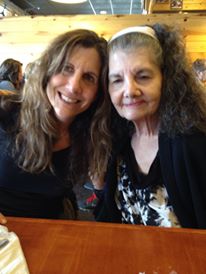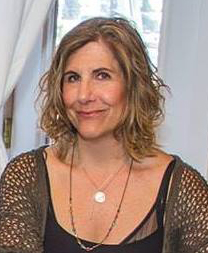by Linda Quon
My mom died in April of this year and I’m still processing. One of my good therapist friends who knows my story called it a “meaningful loss”. She was spot on. My relationship with my mom was…complicated. My mom was a person with Schizophrenia and bi-polar disorder. While I can’t begin to imagine what life was like for her, I’m pretty certain it was really hard. She traveled the universe in a parallel  world. She mingled with planets and spirits and talked to God and Jesus on a regular basis. She shared her adventures passionately and frequently. She self-medicated with alcohol, prescription drugs and cigarettes. And while I can’t tell you what life was like for her, I can tell you what it was like for me. It was really hard.
world. She mingled with planets and spirits and talked to God and Jesus on a regular basis. She shared her adventures passionately and frequently. She self-medicated with alcohol, prescription drugs and cigarettes. And while I can’t tell you what life was like for her, I can tell you what it was like for me. It was really hard.
Since her death, I’ve been exhausted. Tired in a way I’ve never been before. My sleep has been heavy, thick and long. And I’m napping which is crazy because I’ve never been a good napper. So many people have come forward to offer love and support and I’m so grateful. At the same time, I’m never sure how to respond when someone says “there’s nothing harder than losing your mother”. Somehow losing my mother was easier than living with her. It was easier than watching her life. It was easier than feeling angry, hurt, resentful, pitiful, guilty and a bunch of other feelings that are hard to describe. Maybe it’s not the kindest thing to say, but my mom’s passing has been a huge relief to me.
Minding my mind over the past several months has been more challenging than usual. I kept catching myself sighing — almost gasping for air — throughout the day. It felt like I was having trouble breathing, but I think I just needed the extra oxygen in my brain and body. Thankfully, working on the Mind Your Mind Central Oregon campaign made me extra aware of my need to take care of my mental health during this meaningful loss in my life. I don’t think there was any one mindful trick that helped me turn the corner, but a combination of things has made me feel better over time. It’s been 4 months since her death and I’m just now starting to feel more grounded. I have more energy and I’m feeling more social again. Here are a few of the things that have helped me navigate.
Breathing
I started deep breathing in the morning before coffee. I would find a cozy spot in my living room, set my phone alarm for 7 minutes and try to focus only on breathing. In for 4 seconds, hold for 7 seconds and out for 8 seconds. Keeping my brain in the moment seems harder than it should be. Sometimes my mind wanders, but when the chimes ring at 7 minutes, I usually feel grounded and ready to start my day.
Strolling
My dog is a little needy. He won’t go to the bathroom in the yard, so his morning ritual requires a bit of a hike. Sometimes that frustrates me, especially when I have a full day and I’m feeling rushed. At the same time, it forces me to get out and move my body (rain or shine). Often I only have time for a short loop in my neighborhood, but sometimes I steal 30-60 minutes and drive down to the Deschutes River Trail and soak in this beautiful place we get to live in. I try to keep my phone in my pocket or leave it in the car. No music, no podcasts, just quiet time to breath, move and feel gratitude. For neighbors who experience limited mobility, check out Bend Parks and Recreations’ guide to accessible places.
Journaling
The other day my husband — who lost his dad last year — said something that stuck with me. He said ‘‘no one wants to be remembered for their faults”. While mental illness is in no way a “fault”, I find that negative memories of my mom almost completely overshadow the positive memories. Last month, I felt ready to dig for some good (or better) stuff. Through journaling, I found a few more good memories than I expected and my heart softened a little. Journaling my thoughts, feelings and memories helped shave a few of the rough edges from the chip on my shoulder.
Listening to Music
Music is another mindful thing that feeds my soul.
Sometimes just quietly listening lightens my mood, other times making music with my husband or my friends feels like therapy. Playing guitar, singing or dancing around to a favorite band or artist helps me mind my mind.
Gentle Yoga

Stretching and strengthening my body without trying to pretend I’m one of our Central Oregon uber athletes feels like a gift. I’ve found several free yoga videos online and apps that offer 20 minute guided sessions. It’s 20 minutes well-spent and clears my head.
These simple things are helping me mind my mind and manage my feelings about the loss of my mom. Here are a few resources you might consider if you are dealing with a meaningful loss or trying to find peace during a challenging time.
Free Community Events
A free, 12-session education program for adult (18+) family members and friends of people who live with mental illness. I took this class when I moved to Central Oregon in 2005. I found it comforting and helpful as I navigated my family experiences with mental illness.
*Register NOW for new class running September 11-December 4*
Free Outdoor Yoga Summer Series from Wild Thing Yoga
Sundays 9:30am | May 20 - September 23
Deschutes Brewery Lawn
These mindfulness apps include free offerings (with optional in app purchases)
Check your local news outlets for free grief support services and groups. St. Charles Health System offers free grief support programs in Bend, Prineville, Madras.
These are just a few ideas to help us mind our minds when dealing with loss or grief. Our primary care providers can also help us navigate grief and connect with community resources. We all experience grief differently and it’s important for us to recognize it and seek help when we need it.
 Linda Quon is Vice President and Director of Communication at Quon Design and Communication. Linda is working to promote everyday mental health awareness in partnership with Deschutes County Health Central Oregon Health Council — which includes providers and health advocates from Crook, Jefferson, and Deschutes Counties. Linda was born and raised in Southern California and moved to Central Oregon with her husband and two children in 2005. Her mother lived with Schizophrenia and bi-polar disorder and her oldest brother also experienced bi-polar disorder. With support from family, friends and therapists, Linda has been navigating the world of mental illness most of her life — including her own struggles with mild anxiety and depression. Linda is proud to work as an advocate for mental health and a blogger for Mind Your Mind Central Oregon.
Linda Quon is Vice President and Director of Communication at Quon Design and Communication. Linda is working to promote everyday mental health awareness in partnership with Deschutes County Health Central Oregon Health Council — which includes providers and health advocates from Crook, Jefferson, and Deschutes Counties. Linda was born and raised in Southern California and moved to Central Oregon with her husband and two children in 2005. Her mother lived with Schizophrenia and bi-polar disorder and her oldest brother also experienced bi-polar disorder. With support from family, friends and therapists, Linda has been navigating the world of mental illness most of her life — including her own struggles with mild anxiety and depression. Linda is proud to work as an advocate for mental health and a blogger for Mind Your Mind Central Oregon.
